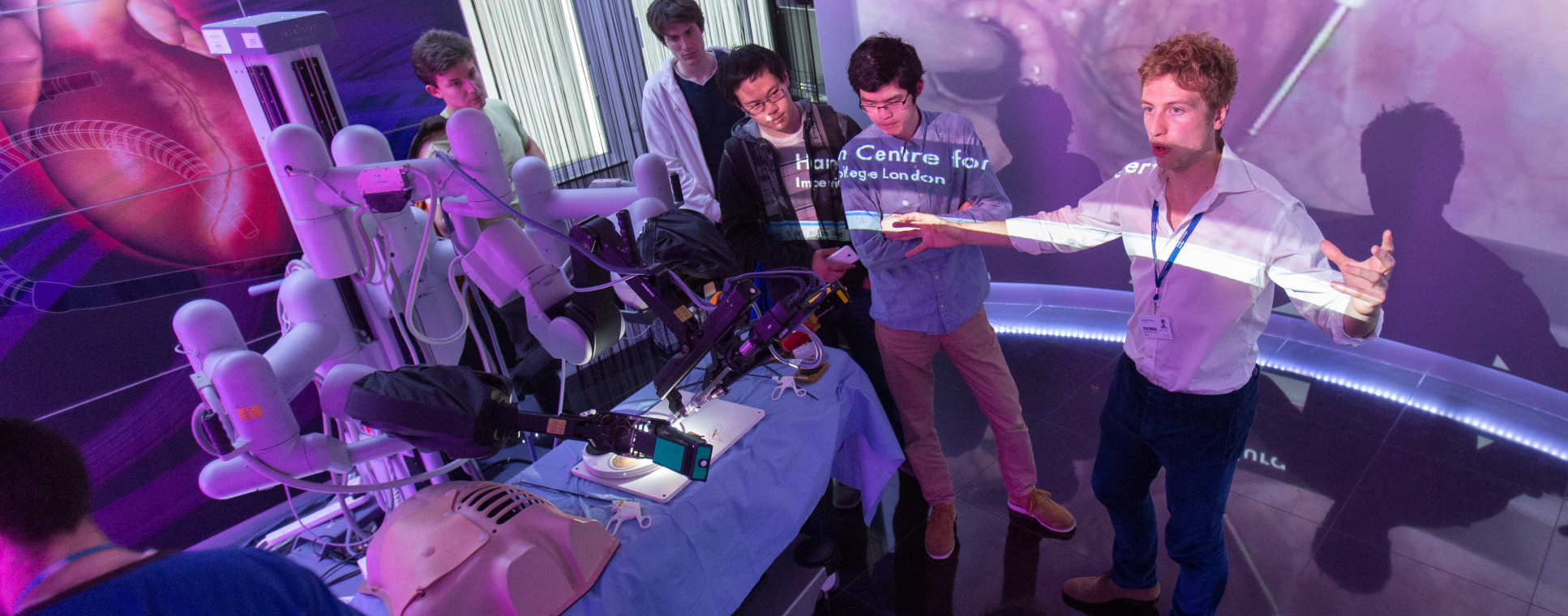MRes & PhD

Imperial College is a leader in surgical technology, image-guided intervention and robotics. This stems from the breadth of activities across the College, including strong engineering and clinical research together with highly fruitful interdisciplinary work promoted by its research environment.
Masters programmes
MRes in Medical Robots and Image-Guided Intervention
By leveraging the unique research strength, state-of-the-art facilities and multidisciplinary environment of the Centre, this MRes course is designed for science/engineering graduates in traditional disciplines to enhance their career opportunities and progression in the following areas:
- Academic research and PhD
- Commercial research and development in medical robotics (the fastest growing sector in the robotics industry)
- Clinical translation of robotic technology, in both public and private sectors (clinical uptake of robotic surgery and image-guided intervention has been rapid, showing over 50 percent annual growth in recent years)
- Research or management career in the medical devices industry
- Careers in IP protection, safety, and regulatory organisations related to medical robotics and image-guided intervention
The course lasts for one year and consists of taught courses, a group research skills project, surgical skills training and a literature review leading to an extended project. Full details on this course are available on the MRes in Medical Robots and Image Guided Intervention programme page.
MRes in Clinical Robotics and AI (a stream on Medical Robotics and Image-Guided Intervention)
This new (launching October 2024) stream of the MRes is intended for medical trainees and clinicians who want to learn about new innovations in medical robotics and how they are being applied in the operating theatre. You will interact with clinical and engineering experts and gain new skills in AI and clinical data science, as well as completing an in-depth research project on an applied and translational topic supervised by one of our clinical academics. The course has been created specifically for clinicians and medically-trained researchers who are interested in learning new skills that will be at the heart of future interventional clinical practice.
This multidisciplinary course introduces the current technology used as well as detailing new clinical advances and procedures. You will study parts of the course alongside engineering and computing Master’s students on the core stream, interacting with them to complement your skills and knowledge, and jointly proposing new translational ideas. With teaching led by internationally renowned departments at Imperial, you'll explore topics including clinical robotics and instrumentation, minimally invasive surgery and surgical data science and AI.
You’ll see first hand how surgery is being transformed during a series of clinical observerships. You'll also apply skills acquired from the course to an eight-month cutting edge research project.
List of modules: Minimally Invasive Surgery, Research Skills Group Project, Clinical Robotics, Surgical Data Science and AI, Clinical Observership, Individual Research Project.
The clinical stream director is Mr Taimur Shah t.shah@imperial.ac.uk. For enquiries and application instructions contact the MRes programme director Professor Daniel Elson ds.elson@imperial.ac.uk.
Applications for the MRes Clinical Robotics and AI stream are now open and details can be found on the prospectus page. Please register your interest in the course to receive more information.
PhD programmes
The Hamlyn Centre's PhD programme is focused around our core research groups:
- Cognitive Vision in Robotic Surgery
- Human Centered Paradigm (HARMS)
- Optical Imaging and Sensing
- The Sensing Intelligence Group
- Surgical Imaging and Biophotonics
- Mechatronics in Medicine
The Centre offers both engineering and clinical tracks for your PhD. Before applying, you are advised to first read the College Postgraduate Prospectus so that you are familiar with the general qualifications, fees, living expenses, and English language proficiency required by the College.
Entry requirements
We normally expect prospective PhD students to have a good honours degree in Engineering, Physics, or Medicine. The positions we offer each year are limited and we give priority to those with outstanding first degrees, or those with an established track record in research, as demonstrated by previous publications and involvement in large research programmes. If you have just graduated from university, we would strongly encourage you to consider the multidisciplinary training offered by the MRes in Medical Robots and Image Guided Intervention programme prior to embarking upon one of the Centre's PhD opportunities.
How to apply
In the first instance, please email the Centre your full CV and a research statement to the academic(s) you wish to study with directly. You will then be advised on the appropriate research track, further details of the application procedure, and potential funding opportunities.
Scholarships and funding opportunities
The Centre offers a limited number of funded PhD positions each year through our core research programmes and named scholarships. Further information on all the scholarships available to prospective students can be found using the Scholarships search tool.


